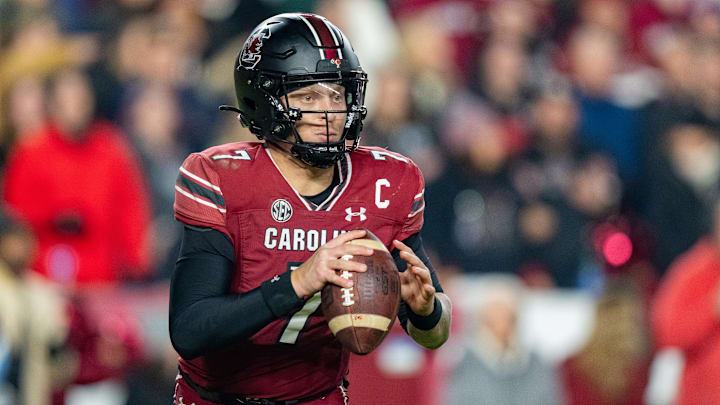The NY Jets are entering a pivotal stage of their story. With Aaron Rodgers set to return from his Achilles injury, the Jets are one of the dozen or so NFL teams currently in their Super Bowl window.
While fans can argue the following players would be great for the long-term success of this team, the fact of the matter is that Joe Douglas and his brass need to continue to do everything in their power to make sure the roster is good enough to compete with the likes of Kansas City, Baltimore, and Buffalo in 2024.
Here are some 2024 NFL Draft selections that have been mocked to the Jets that should be avoided.
Round 1, No. 10 overall, NY Jets: Taliese Fuaga, OT, Oregon State
Does Taliese Fuaga have the tools to be an efficient outside tackle at the next level? Absolutely. However, the Jets are in win-now mode. Fuaga still has steps to take as a pass blocker, despite posting incredibly impressive numbers over the past two seasons at Oregon State.
Fuaga still lacks some consistency in terms of his footwork, and oftentimes has a tendency to rely on his 6-foot-6, 324-pound frame, not getting into proper position as a pass blocker. Fuaga will have to adjust to the size and speed of edge rushers at the next level, and he'll have to alter his playstyle to do so.
Fuaga has been frequently mocked to the Jets, and it would be a mistake for Douglas to choose him over the likes of Olu Fashanu, and JC Latham. That's all if the pick is on the offensive line. If names like Rome Odunze and Brock Bowers are available to the Jets, they should be sprinting to the podium.
If the pick ends up being a lineman they should be going in a different direction.
Round 3, No. 72 overall, NY Jets: Spencer Rattler, QB, South Carolina
Spencer Rattler has almost cemented himself as the seventh quarterback in this class, and he has been projected to be taken by teams all across the league.
While the Jets do have somewhat of a need to address their quarterback of the future, Rattler does not inspire too much confidence as the guy who can fill the shoes of Aaron Rodgers.
Rattler is one of the few quarterbacks to fail under the tutelage of Lincoln Riley, who coached at Oklahoma during Rattler's two seasons starting for the Sooners.
Riley was able to develop guys like Baker Mayfield, Kyler Murray, and Jalen Hurts into solid NFL players, with Rattler being one of his only failed ventures. Rattler grew to stardom during his days on QB1 and was the top recruit in the 2019 high school class.
He eventually lost his job to projected No. 1 overall pick Caleb Williams, and it was evident that Rattler was the far less superior player quickly. The Jets can wait a year on this one, or go with a guy like Jordan Travis later on Day 3.
Round 4, No. 111 overall, NY Jets: Ray Davis, RB, Kentucky
Ray Davis was incredibly efficient in his final season for the Wildcats. While the Jets do have Breece Hall as their clear RB1 heading into the 2024 season, it wouldn't be a horrible idea to draft a capable backup for the Iowa State product.
Running back will likely be addressed at some point on day three for New York, but they should be going in a different direction. Davis is a below-average run and pass-blocker, and at the next level will only likely be used as a bruiser and a goal-line back.
The Jets should be looking at these types of guys, as it was clear last season that Hall is a very capable every-down running back, but there are other names that will be available to them at this point. Guys like Braelon Allen and Bucky Irving would be the wiser move at this spot.
Davis can absolutely be a contributor in the league, but the Jets should be looking for backs who can excel as blockers for Aaron Rodgers and company.
Round 4, No. 134 overall (via BAL), NY Jets: Jacob Cowing, WR, Arizona
Jacob Cowing was an incredible receiver in the slot during his time with the Wildcats and is projected to be an early Day 3 selection in this year's draft.
However, if the Jets are looking at adding to the receiver room, they should pivot to somebody who has better size and is more suited for what they need as an offense — prospects like Devontez Walker or Javon Baker.
Cowing stands at 5-foot-8, 165 pounds. There's really only one other example of a receiver that small going on to have a fairly productive season or career and that's now second-year wide receiver for the Texans, Tank Dell. The Jets need more size at receiver, despite the addition of Mike Williams.
